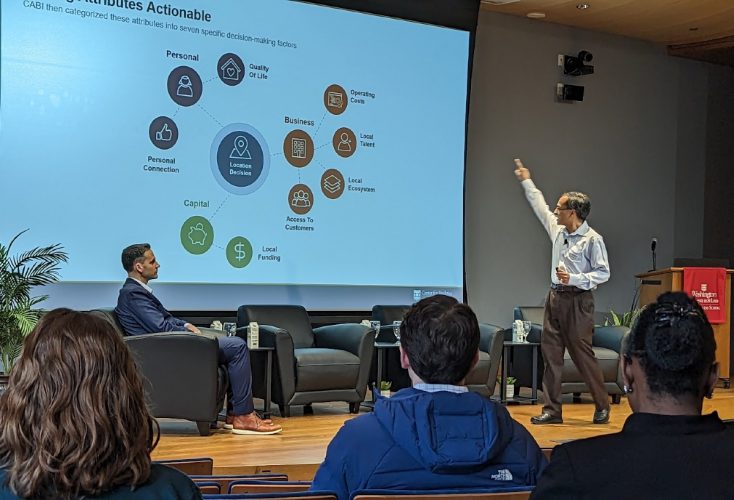The Data for Good conference is an event for members of the business community at large. The concept of the event focuses on how businesses can move forward using data while also staying true to values that promote good in the world.
During this event, Olin’s Center for Analytics and Business Insights (CABI) shared its framework for developing data-driven strategies for the benefit of St. Louis companies looking to create their own sustainable prosperity in their communities and in the region as a whole.
The pillars of this conference are also core to the Olin MBA program. We are on a mission to discover a more values-driven approach to data and help shape the next generation of business leaders with “good data” leadership in mind. The conference asks us how we can move beyond using data for good as a concept and discover first-hand how data can be used to responsibly solve critical business, civic, and social issues.
Why has “data for good” become a call to action?
Business has reached a particular moment in history where the amount and quality of data available is unprecedented. Vast quantities of data pass through organizations every day, ready to be collected and used to their advantage.
Yet, businesses also stand at a crossroads in terms of how to best make use of data and how to maintain longevity. Corporate data responsibility is still in its formative years as leaders are realizing that not all data is created equal. Data can be used in negative ways, and misused data can expose a company to harmful attacks and breaches of privacy. What we realize is that we need leaders who are trained to understand the power and responsibility associated with the enormous amount of data available today.
In order to use data for good, businesses must become more aware of the changing landscape around the collection and utilization of data. Consumers are more educated on this issue than ever, and they have increasingly high expectations for how companies treat their information. And alongside consumer changes are public policy shifts. Regulations are being crafted all the time to outline data management ethics that protect consumers and provide guidance to businesses.
How can an online MBA program create better data leaders?
The same values-driven pillars that are guiding the Data for Good conference also guide us at Olin.
Students in Olin’s MBA program learn about social and civic goals at the same time as they practice creating positive business outcomes. They learn, from the beginning, to think of themselves as leaders of social change as well as leaders of prosperous businesses. They learn what it means to be a responsible business leader.
At the CABI research center, our research projects all have a “data for good” focus and aim to solve complex community and societal issues. For example, one of those projects was aimed at combating the opioid epidemic plaguing the United States. This is a current and demanding issue, one that surrounds many of our students’ hometowns and counties. During the project, we utilized advanced analytics and data modeling techniques very similar to those used in a business setting. The same strategies used to create growth in a business are used to create momentum for change.
The outlook we espouse is that successful leaders can take a consistent approach to very different goals, problems, and intended outcomes. That outlook involves first setting up a clearly defined objective or set of objectives. What do you want to achieve? What is the ideal scenario and the next ideal?
See the full 2023 symposium
From there, students learn to determine which key results must be achieved to realize those objectives. How will we know if we have succeeded? Then, with those core pieces of information at their disposal, leaders can establish the specific activities they can perform or initiate that are likely to enable those desired results.
What does data have to do with this methodology? Well, at each point of the strategy, data and technology can be used to help: to help guide the process, help speed things along and add insight. Most importantly, each step we take with data is guided by the objectives and values we’ve set up already; this is how we know what our priorities are.
Culture is key to the courses we teach and how we teach them. The word culture comes from the same French and Latin roots as the word cultivate; this is an action word — cultivation requires a continuous, careful force. This is how we think about crafting culture at Olin.
We nurture a culture of leading with values. Everything — from the questions we ask to the data-driven actions we take — must be guided by values. Tools are there to help us, but we must first know how to use them for good. And we want to share the knowledge to carefully wield those tools with not just our students but also our community.
Pictured above: Olin’s Seethu Seetharaman, director of the Center for Analytics and Business Insights and W. Patrick McGinnis Professor of Marketing, outlines a data-driven process the center developed to guide economic development decisions in St. Louis. The presentation was at the March 2023 Data for Good symposium.








